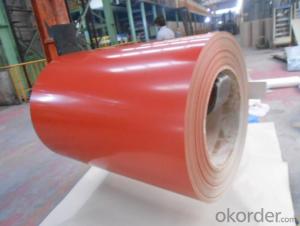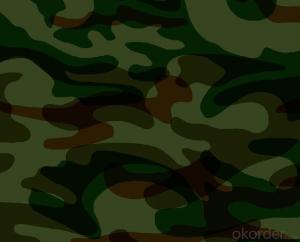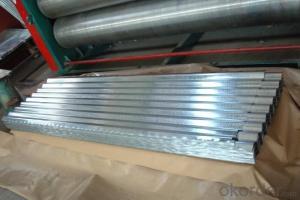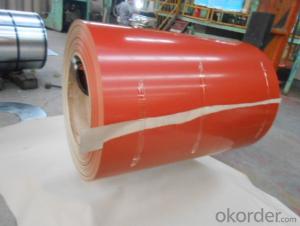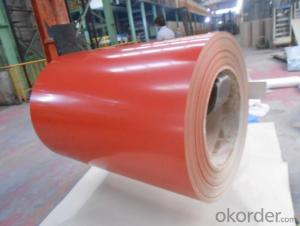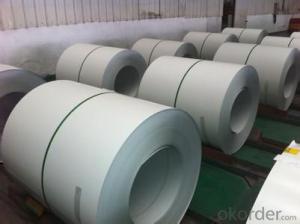Pre Painted Galvanized/Aluzinc Steel Coils of Best Quality Red Color
- Loading Port:
- Shanghai
- Payment Terms:
- TT OR LC
- Min Order Qty:
- 50 m.t.
- Supply Capability:
- 2000 m.t./month
OKorder Service Pledge
OKorder Financial Service
You Might Also Like
1. Pre-Painted Galvanized/Aluzinc Steel Coil Description:
With GI as base material, after pretreatment (degrease and chemical treatment ) and liquid dope with several layers of color, then after firing and cooling, finally the plate steel is called pre-painted galvanized (aluzinc) steel. Pre-painted galvanized steel is good capable of decoration, molding, corrosion resistance. It generally displays superior workability, durability and weather resistance.
2.Main Features of the Pre-Painted Galvanized/Aluzinc Steel Coil:
• Excellent process capability
• Smooth and flat surface
• Workability, durability
• Excellent heat resistance performance
• High strength
• Good formability
• Good visual effect
3.Pre-Painted Galvanized/Aluzinc Steel Coil Images
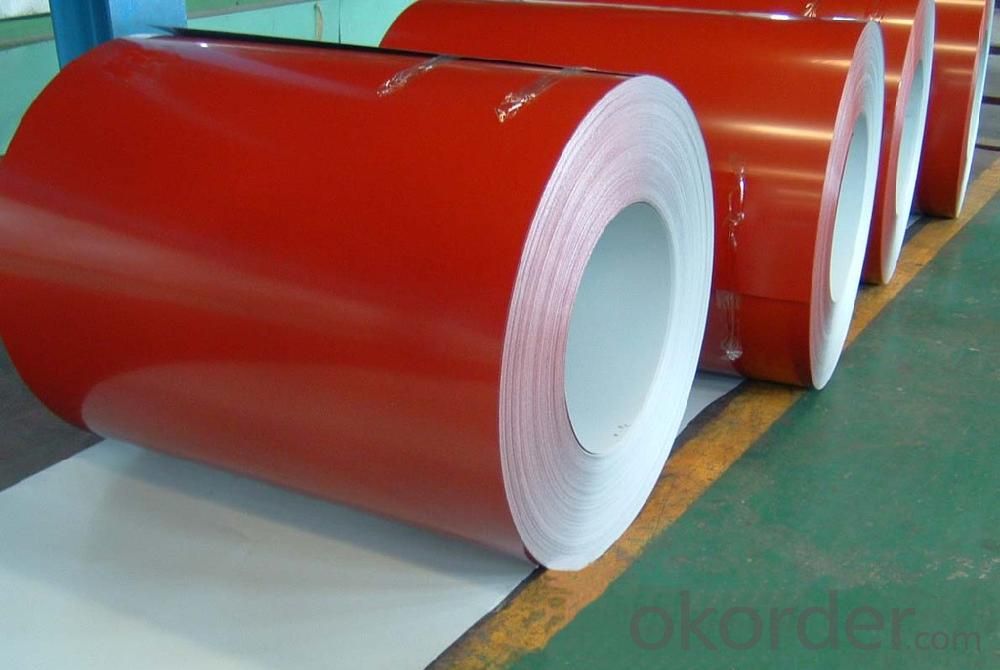
4.Pre-Painted Galvanized/Aluzinc Steel Coil Specification
Standard: AISI, ASTM, BS, DIN, GB, JIS
Grade: DX51D, DX52D
Thickness: 0.17-2.0mm
Brand Name: KMRLON
Model Number: coil
Type: Steel Coil
Technique: Cold Rolled
Surface Treatment: Coated
Application: Boiler Plate
Special Use: High-strength Steel Plate
Width: 20-1250mm
Length: customized
commoidty: pre-painted galvanized steel coil
Thickness: 0.13-4.0mm
width: 20-1250mm
zinc coating: 40-180g/m2
printing thickness: top side: 20+/-5 microns, back side: 5-7 microns
color: all RAL color
surface treatment: color coated
coil weight: 4-7 tons
coil ID: 508/610mm
packaging: standard seaworthy packing
5.FAQ of Pre-Painted Galvanized/Aluzinc Steel Coil
1. What’s the application of this product?
Roof, roof structure, surface sheet of balcony, frame of window, etc.
2. What’s the brand of the paint?
We use the best brand of all of the word—AKZO.
3. How about your company?
A world class manufacturer & supplier of castings forging in carbon steel and alloy steel,is one of the large-scale professional investment casting production bases in China,consisting of both casting foundry forging and machining factory. Annually more than 8000 tons Precision casting and forging parts are exported to markets in Europe,America and Japan. OEM casting and forging service available according to customer’s requirements.
4. How to guarantee the quality of the products?
We have established the international advanced quality management system,every link from raw material to final product we have strict quality test;We resolutely put an end to unqualified products flowing into the market. At the same time, we will provide necessary follow-up service assurance.
5. How long can we receive the product after purchase?
Usually within thirty working days after receiving buyer’s advance payment or LC. We will arrange the factory manufacturing as soon as possible. The cargo readiness usually takes 15-25 days, but the shipment will depend on the vessel situation.
- Q: How are steel coils used in the production of building systems?
- Steel coils are used in the production of building systems as they provide a cost-effective and versatile material for various construction applications. These coils are often processed and shaped into different components, such as beams, columns, and roofing materials, to meet the structural requirements of buildings. The strength and durability of steel make it an ideal choice for constructing high-rise buildings, industrial facilities, and other structures that require stability and longevity.
- Q: How do steel coils compare to aluminum coils?
- Steel coils and aluminum coils have several key differences that make them suitable for different applications. Firstly, steel coils are known for their strength and durability. They can withstand high temperatures and are less prone to damage compared to aluminum coils. This makes steel coils ideal for heavy-duty industrial applications that require robust materials, such as construction, automotive manufacturing, and oil and gas industries. Steel coils are also more resistant to corrosion, making them suitable for outdoor use in harsh environments. On the other hand, aluminum coils are lighter and have a higher strength-to-weight ratio compared to steel coils. This makes them perfect for industries where weight is a critical factor, such as aerospace and transportation. Aluminum coils are also more malleable, allowing for easier shaping and forming, which is advantageous in industries like packaging and consumer electronics. Moreover, aluminum coils have better thermal conductivity than steel coils, which makes them more efficient in heat transfer applications. This property is beneficial in industries like HVAC (heating, ventilation, and air conditioning) and refrigeration, where efficient heat exchange is crucial. In terms of cost, steel coils are generally more affordable compared to aluminum coils due to the lower cost of raw materials. However, aluminum coils can offer long-term cost savings as they require less maintenance and have a longer lifespan due to their resistance to corrosion. In conclusion, the choice between steel coils and aluminum coils depends on the specific requirements of the application. Steel coils are preferred for their strength, durability, and corrosion resistance, while aluminum coils excel in lightweight applications, heat transfer, and malleability.
- Q: How are steel coils used in the production of automotive engine components?
- Steel coils are used in the production of automotive engine components by being processed and shaped into various parts, such as pistons, crankshafts, and connecting rods. The coils are first cut, stamped, and formed into the desired shapes, and then undergo heat treatment and other machining processes to enhance their strength and durability. These components are crucial for the proper functioning of an automotive engine, as they provide structural support and help convert the energy generated by the combustion process into mechanical motion.
- Q: How are steel coils used in the manufacturing of electrical components?
- Steel coils are commonly used in the manufacturing of electrical components as they provide a sturdy and reliable framework. They are used to create magnetic cores, which play a crucial role in transformers, motors, and generators. Additionally, steel coils are utilized in the production of inductors and solenoids, where they help generate and control magnetic fields. Overall, steel coils are essential in electrical component manufacturing due to their ability to enhance the efficiency and functionality of these devices.
- Q: What are the different types of steel coil finishes?
- There are several different types of steel coil finishes, including mill finish, galvanized finish, painted finish, and stainless steel finish.
- Q: and what type of metal is steel?
- Steel is an alloy consisting mostly of iron, with a carbon content between 0.2% and 2.14% by weight (C:110–10Fe), depending on grade. Carbon is the most cost-effective alloying material for iron, but various other alloying elements are used such as manganese, chromium, vanadium, and tungsten. Carbon and other elements act as a hardening agent, preventing dislocations in the iron atom crystal lattice from sliding past one another. Varying the amount of alloying elements and form of their presence in the steel (solute elements, precipitated phase) controls qualities such as the hardness, ductility, and tensile strength of the resulting steel. Steel with increased carbon content can be made harder and stronger than iron, but is also more brittle.
- Q: How do steel coils differ in terms of size and weight?
- Steel coils can differ in terms of size and weight based on the specific requirements and applications. The size of steel coils can vary depending on the industry and intended use, ranging from small coils weighing a few hundred kilograms to larger coils weighing several metric tons. The weight of steel coils is primarily determined by the thickness, width, and length of the coil, with thicker and wider coils generally being heavier. Therefore, the variation in size and weight of steel coils is based on the specific needs of different industries and applications.
- Q: Can steel coils be customized according to specific requirements?
- Yes, steel coils can be customized according to specific requirements. Manufacturers can alter the dimensions, thickness, width, and other specifications of steel coils to meet the specific needs of customers.
- Q: What are the different methods of coil recoiling for narrow strip widths?
- Some of the different methods of coil recoiling for narrow strip widths include slitting and rewinding, oscillating winding, and turret winding.
- Q: density of mild steel (MS) is 7850 KG per metre cube , but i want to know the density of stainless steel
- Stainless steels are the most dense, coming in at 8000 kg/m3. Though the densities vary, The answer is 8000 kg/m3. 301 stainless density values seem to vary according to the supplier data sheets, from 7.88 g/cc, (AK Steel) to 8.03 g/cc, (Allegheny Ludlum)
Send your message to us
Pre Painted Galvanized/Aluzinc Steel Coils of Best Quality Red Color
- Loading Port:
- Shanghai
- Payment Terms:
- TT OR LC
- Min Order Qty:
- 50 m.t.
- Supply Capability:
- 2000 m.t./month
OKorder Service Pledge
OKorder Financial Service
Similar products
Hot products
Hot Searches
Related keywords
